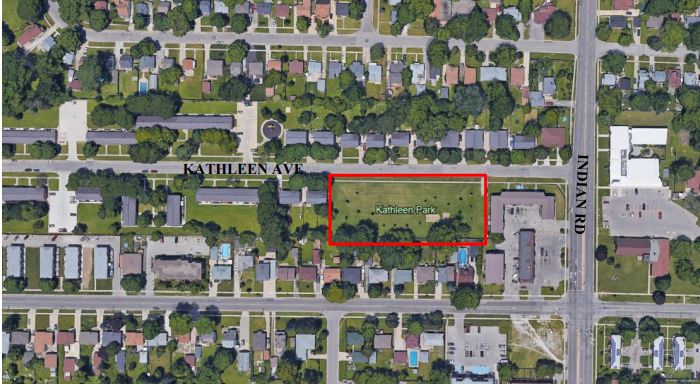A new proposal for 50 units on Kathleen Ave aims to address Sarnia’s affordable housing needs but faces barriers from existing zoning bylaw mandates on parking. The site, near Indian Road, is primarily vacant except for a steel slide.
The 3-storey proposed building will feature 14 barrier-free units (768 ft²) and 36 standard one-bedroom units (550 ft²). All 50 units will be affordable, with the 14 accessible units supported by March of Dimes.
Located in a well-connected area, the development is served by public transit. It is within walking distance of several amenities, including the Dow Centre for Youth, two schools, and a municipal park with sports facilities. It is also just a five-minute walk to a commercial plaza featuring a Shoppers Drug Mart and a ten-minute walk to a grocery store.
This proposal brings unique features to Sarnia’s development landscape, demonstrating a thoughtful alignment with the demographic it aims to serve and its proximity to existing amenities.
Key elements of the proposal include 25 bicycle parking spaces, an in-building scooter/bicycle parking room, and a notably low parking ratio of 0.5 spaces per unit.
One of the more innovative aspects of the proposed development is the request for a reduction in the mandatory parking requirements. Under current zoning laws for UR-5, the development would be required to provide 79 parking spaces—1.5 spaces per dwelling unit, plus additional spaces for office areas. However, the developers are proposing a much lower ratio of 0.5 parking spaces per unit, amounting to just 31 spaces in total—25 for tenants and 6 for visitors or March of Dimes staff.
This proposed reduction reflects a deeper understanding of the needs of the development's intended residents and its more central location in Sarnia.
The Parking Reform Network is an organization that supports advocates and professionals in reducing or eliminating excessive parking mandates in urban areas. Their research highlights the obstacles created by parking policy and parking politics on affordable housing, bike lanes, and transit infrastructure Their research demonstrates several key benefits of lowering mandatory parking requirements on projects like this, including:
Reducing sprawl. Lower parking requirements curb the spread of low-density developments and surface parking lots, promoting more concentrated, sustainable urban growth.
Encouraging transit-oriented development. This shift enables developers to focus on building near transit hubs, creating walkable, pedestrian-friendly neighbourhoods with easy access to shops, parks, cafes, and other daily needs.
Lowering construction costs and rents. Eliminating unnecessary parking spaces reduces overall development costs, which in turn makes housing more affordable—particularly for low-income residents who are less likely to own a vehicle and shouldn’t have to bear the cost of parking through higher rents.
Promoting sustainability. Fewer parking spaces incentivize alternative modes of transportation, such as public transit, cycling, walking, and car-sharing. This reduces traffic congestion and greenhouse gas emissions.
The proposal aligns with broader provincial and local policy goals. Ontario’s Provincial Policy Statement sets the rules for land use planning in Ontario and encourages the development of affordable housing and mixed-use residential projects, particularly in areas well-served by transit. As part of its commitment to sustainable urban development, the City of Sarnia is aiming for 45% of its residential growth to occur within the existing Built-Up Area, with at least 30% of new housing units to be affordable.
The proposed Zoning By-Law Amendment represents an important step forward in addressing the city's housing needs, while also promoting more sustainable and equitable urban growth. As Sarnia faces a housing crunch, this proposal raises a critical question: should parking mandates hold back developments that prioritize people, accessibility, and affordability?
A public meeting will be held November 18th, 2024 at 1pm and if approved, a subsequent site plan agreement will be required to implement the proposal.
